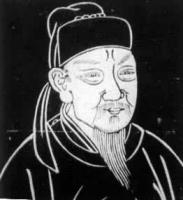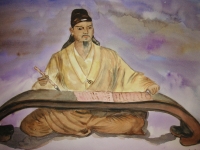唐代
中唐(
773 AD~
819 AD)
| poetry corpus: | 《柳宗元集》
| | Historical writings: | 《龙城录》
| | Poetry: | 《READING BUDDHIST CLASSICS WITH ZHAO AT HIS TEMPLE IN THE EARLY MORNING》 《Dwelling By a Stream》 《An Old Fisherman》 《From the City-tower of Liuzhou to my Four Fellow-officials at Zhang, Ding, Feng, and Lian Districts》 《River-snow》 《奉平淮夷雅表。皇武命丞相度董师集大功也》 《Feng Ping Huaiyi Heuer City Life Su Fang Shou Cai also keeping a big ugly Death into the Huai River to the right level》 《Tang Song Rao Advocating qu Troubadour Sui articles only extremely chaotic division as Jin Tang Yang wu chiefly》 《Tang song rao advocating qu troubadour book Tang Fei Receive instructions Li mi Since the defeat for the poor beasts secondly》 《Tang song rao advocating qu troubadour book The second empiror since founding of a country Teacher discussion Wang chong Dou jiande Combat arms firm third》 More poems... |
Read works of Liu Zongyuan at 小说之家
Read works of Liu Zongyuan at 诗海
|
 柳宗元
柳宗元 柳宗元
柳宗元
Liu Zongyuan (Chinese: 柳宗元; Pinyin: Liǔ Zōngyuán) (773 – 819) was a Chinese writer who lived in Chang'an during the Tang dynasty. Along with Han Yu, he was a founder of the Classical Prose Movement (古文運動). He was traditionally classed as one of the Eight Great Prose Masters of the Tang and Song.
His civil service career was initially successful, but in 805 he fell from favour because of his association with a failed reformist movement. He was exiled first to Yongzhou, (Hunan province), and then to Liuzhou (Guangxi province). However, this setback allowed his literary career to flourish: he produced poems, fables, reflective travelogues and essays sythesizing elements of Confucianism, Taoism and Buddhism.
His best-known travel pieces are the Eight Records of Excursions in Yongzhou (永州八游记, Yǒngzhōu bā yóujì). Around 180 of his poems are extant. Some of his works celebrate his freedom from office, while others mourn his banishment.

